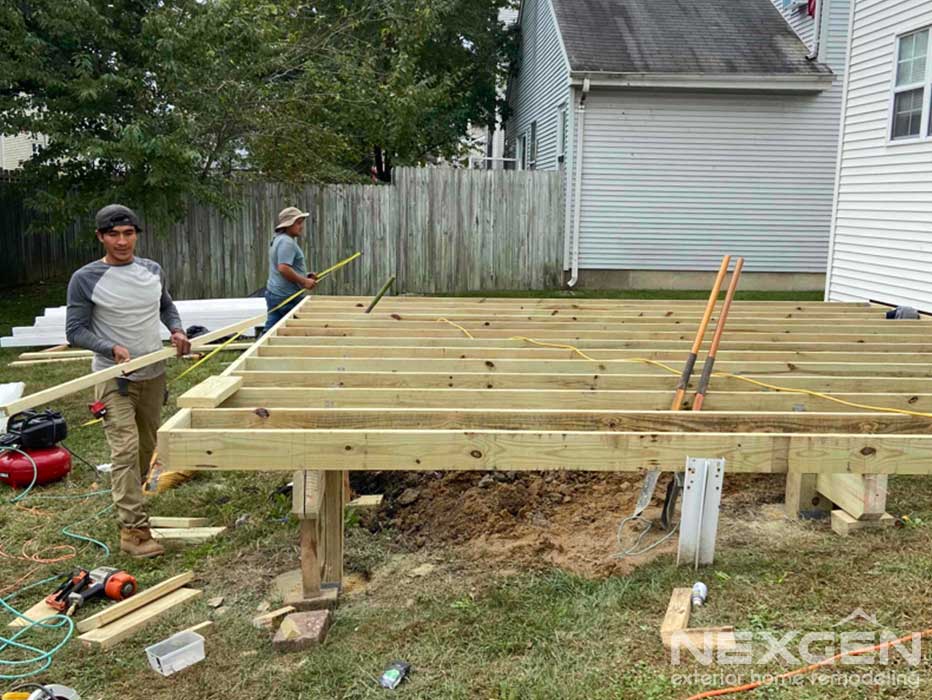Exactly how to Pick the Right Products for Your Deck Installation Task
Selecting the appropriate materials for your deck installation project can seem complicated. There are countless variables to take into consideration, from longevity and maintenance to aesthetics and environmental impact. The selection between standard wood and composite products, each with its own set of benefits and disadvantages, can be particularly tough. The trick is to stabilize your budget, style choices, and lifestyle requires to create a deck that will certainly boost your exterior area for many years ahead.
Understanding the Different Sorts Of Deck Materials
When embarking on a deck installment task, the selection of products becomes a crucial choice. Numerous alternatives are available, each with unique characteristics and aesthetic allure. Typical timber, for instance, supplies an ageless, natural look and is normally more cost-effective. It can warp over time and requires routine upkeep. Composite materials, on the various other hand, are a blend of timber and plastic, giving longevity and resistance to weather elements. They require less maintenance compared to timber but are typically more expensive. One more alternative is plastic, which is essentially maintenance-free and resistant to parasites and rot, albeit less natural-looking. By recognizing these distinctions, property owners can make a much more informed choice on the most appropriate deck material for their specific demands.
Assessing the Sturdiness and Upkeep Requirements of Deck Materials
Assessing the sturdiness and maintenance requirements of deck materials is a crucial action in deck installation. Longevity entails the material's capacity to withstand severe weather problems, wear and tear, and its long life.
Recognizing maintenance requirements is similarly crucial. Some materials call for normal securing or staining to preserve their appearance and resist wetness damage, while others, like composite decking, demand less upkeep. By assessing these aspects, one can pick one of the most ideal outdoor decking material, making sure a balance between resilience, maintenance requirements, and aesthetic charm.
Cost Evaluation: Contrasting Timber and Compound Decking
Although expense might at first seem like a secondary concern, it is a considerable factor when contrasting timber and composite decking. On the various other hand, composite decking, while more expensive at first, calls for less upkeep, potentially decreasing long-lasting expenses. Potential deck proprietors should consider their budget and readiness to keep their decks when deciding between timber and composite decking.
Aesthetic Appeals and Layout Versatility of Decking Products
All-natural wood outdoor decking provides a classic, ageless look, while composite materials supply a large array of shades and textures to suit varied preferences and styles. Compound materials, while less flexible in style, are still versatile enough for many deck layouts. These factors, for that reason, are critical factors in the selection of outdoor decking product.
Environmental Impact of Decking Products
When selecting decking materials, one need to consider not only appearances and resilience, but also the environmental influence. It's important to assess the sustainability of materials and discover recycled outdoor decking alternatives. Recognizing the potential effect on regional ecological communities will certainly make sure a more eco responsible selection.
Evaluating Product Sustainability
In the world of deck building and construction, assessing product sustainability is a critical step. This browse around here entails examining the environmental impact of each possible material, taking into consideration aspects such as the energy needed for its manufacturing, its carbon footprint, and its end-of-life disposal or reusing options. Timber is a renewable source, but unsustainable logging methods can lead to deforestation. Additionally, composite decking products frequently incorporate wood and plastic, lowering the demand for brand-new wood yet enhancing dependence on nonrenewable fuel sources. Aluminum and various other steels may be a lot more durable and recyclable, however their removal and handling can be energy-intensive. Thus, the option of outdoor decking products ought to stabilize capability, looks, price, and sustainability important link to guarantee an accountable and durable installation.
Recycled Outdoor Decking Alternatives

Composite outdoor decking is especially preferred due to its durability and convenience of maintenance. It's immune to rot, bugs, and fading, making it a long-lasting choice. Recycled plastic outdoor decking, on the other hand, is highly durable and needs marginal maintenance. While these products may carry a higher preliminary expense, their durability and lowered ecological influence make them a wise investment for the eco-conscious property owner.

Influence On Local Communities
While the benefits of utilizing recycled materials for decking can not be overstated, it's just as important to consider the wider ecological effects of these selections. Proper disposal of old decking is vital to reducing garbage dump waste. Basically, an eco-conscious deck job needs cautious material option, lasting sourcing, and accountable disposal.
Making Your Decision: Tips for Picking the Ideal Deck Materials
As the short article transitions right into the subtopic of "Making Your Last Decision: Tips for Picking the Finest Deck Materials", it is crucial to recognize visite site the range of deck materials readily available. Striking a balance between longevity and appearance is necessary in this choice process. The adhering to discussion will certainly direct readers in making an educated choice based upon these essential factors to consider.
Comprehending Various Deck Materials
The job of picking the best products for your deck installation can appear discouraging due to the large selection of choices available. Nevertheless, recognizing the various materials can simplify this process. Wood is a prominent choice, offering a classic visual and affordability. Types of timber made use of include pressure-treated lumber, cedar, and redwood. Compound products, made from a mix of timber and plastic, are low-maintenance and resistant to rot and insects. Plastic or PVC decks are even a lot more resilient and require less maintenance than composite materials, yet they can look much less all-natural. Lastly, aluminum decks are strong, lightweight, and immune to rot, however they are additionally one of the most pricey option. Each material has its own benefits and disadvantages, making it critical to consider your details needs prior to making a last choice.
Longevity vs. Visual Appeals Balance
Stabilizing longevity with appearances can be an obstacle when choosing deck materials. The choice usually comes down to personal choices and the deck's meant usage. High-traffic locations might demand sturdy materials like composite decking, which withstands damage however might lack the all-natural appeal of wood. On the other hand, timber uses a classic appeal and heat that synthetic products struggle to reproduce. It calls for much more upkeep and might not last as long. House owners need to strike an equilibrium, considering both the deck's functional needs and their aesthetic choices. By doing so, they can ensure their deck continues to be a functional and appealing exterior room for several years to come.
Conclusion
Finally, selecting the appropriate products for your deck setup project requires careful factor to consider of variables such as longevity, upkeep, expense, aesthetics, and ecological effect. Whether you go with conventional wood or composite products, your choice should straighten with your budget, layout preferences, and way of life. Ultimately, the very best outdoor decking material is one that enhances your outdoor area and provides pleasure for many years to come.